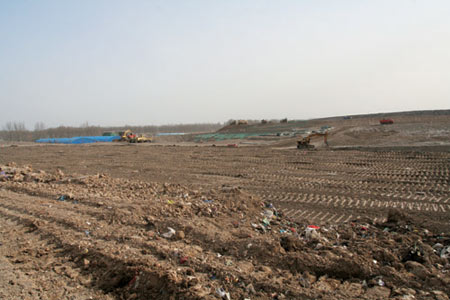
A landfill tax?
Though Beijing sanitation department is helped a lot by the waste-collecting guerilla, it's still stretched by the sheer amount of trash the city generates.
According to the Beijing Urban Administration Commission, until the end of 2005, 3.1 percent of the rubbish was set on fire, 8.4 percent was recycled as fertilizer and a massive 88.5 percent was dumped in landfill.
A landfill tax was proposed to try to control household garbage, a similar idea to charging for plastic bags to control white pollution.
The proposed landfill tax is a new concept in China but fees for garbage disposal have been around for years. In Beijing each household pays three yuan per month for the garbage disposal.
"An average three-person family produces about 1.6 tons of garbage per year. The present 36-yuan per year garbage disposal fee is too low since the actual disposal cost is around 120 to 125 yuan per ton," Professor Wang Weiping said, adding "increasing the fee might arouse a question on whether the charge is reasonable, but it's the most feasible measure now."
Professor Du, however, disagrees with Wang and maintains "the amount of garbage is determined by a resident's consumption habits and isn't directly related to the fee."
Garbage collection fees have been a source of disputes in many places both domestically and overseas. In 2001, Guangdong Province vetoed a draft regulation on waste disposal fees. The British government last year proposed a landfill tax that met with objections from all sides and was eventually ruled out on grounds of complexity.
Professor Wang said however the general trend would be to charge disposal fees according to the actual amount of a household's garbage.
(China.org.cn by Zhou Jing, April 8, 2008)